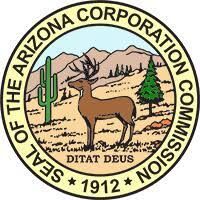PHOENIX — A House panel voted Tuesday to give Arizonans fewer choices for who sets the rates they're charged by utilities.
The measure crafted by Rep. Gail Griffin, R-Hereford, would require candidates for the Arizona Corporation Commission to be at least 30 years old and have been a state resident for two or more years.
Moreover, House Bill 2536 would disqualify anyone from running for the commission in 2024 and beyond unless they have at least five years experience in specified areas. These include accounting, business administration, finance, administrative law or professional engineering.
"This is a highly technical job," said Griffin, who chairs the Committee on Natural Resources, Energy and Water. She told colleagues the qualifications were "suggested'' to her, though she denied they came from the utilities the commission regulates.
But Sandy Bahr, lobbyist for the Arizona chapter of the Sierra Club, suggested the requirements were drawn so narrowly as to eliminate other people who have a legitimate role in setting energy policy and rates.
For example, if lawmakers are looking for qualifications, they should also consider those who have training in water or energy policy, she said.
"Why not a background in climate science or a consumer advocate?" said Bahr, whose organization appears before the Corporation Commission to talk about the environmental implications of its decisions.
She scoffed at the idea that the work done and the policies set by the five-member commission are any more technical than the work done at the Capitol.
"You don't require legislators to have any qualifications," Bahr said. "You all deal with a broad range of technical issues. You don't have to have a background in education, in environment, in any of those things."
Griffin's proposal also drew derision from Kris Mayes, who served as a Republican commissioner from 2003 through 2010 and was instrumental in adopting clean-energy requirements for utilities.
"This is an attempt to prevent Arizonans from voting for strong consumer advocates," Mayes, who did not attend Tuesday's meeting, told Capitol Media Services. Mayes, now running for attorney general as a Democrat, called it the bill a "pro-utility, anti-consumer" measure.
While only the Republicans on the committee voted for HB 2536, its effects would appear to be bipartisan.
Rep. Andres Cano, D-Tucson, said had this been in law, a whole list of Republicans who served on the commission would not have been qualified to run.
For example, he said Republican Mike Gleason, who chaired the commission, got his bachelor's degree in forestry.
"Gary Pierce?" Cano continued. "He was a car dealership manager."
Bob Stump's background included being a journalist and freelance writer for newspapers.
Bahr pointed out that attorney Marc Spitzer served on the Corporation Commission until 2006 when he was appointed by President George W. Bush to the Federal Energy Regulatory Commission.
"But with this in place, (he) wouldn't be qualified to serve on the commission here because, well, he's just a lawyer," Bahr said.
Bahr said individual expertise in technical issues isn't necessary for commissioners, just as it is not necessary for legislators, as both groups have access to highly qualified staff to provide that expertise.
That didn't convince Rep. Mark Finchem, R-Oro Valley, who is running for secretary of state, a position that does not have specific qualifications.
"We rely a little too much on staff and not enough on unique qualifications of individuals who are uniquely certified, uniquely prepared, uniquely educated for various roles in leadership," Finchem said. He said that is particularly true at the Corporation Commission in "an increasingly technologically challenged energy environment."
Cano, however, said the measure, which now requires approval of the full House, is overly restrictive.
"We should be expanding voter choice and we should be allowing a wide range of candidates to be able to be on the stage and have that ability to convince voters that they can handle energy policy," he said.
Last year, Griffin sponsored unsuccessful legislation to strip the commission of its power to set energy policy for utilities.
That followed the commissioners' decision to propose that half of the state's energy be generated from carbon-free sources and that power be totally carbon-free by 2050. Griffin said the panel should have considered what she said are lower-cost alternatives like coal and gas-fired power plants.
Just this past week, however, the three Republicans on the commission quashed the clean-energy rules.





